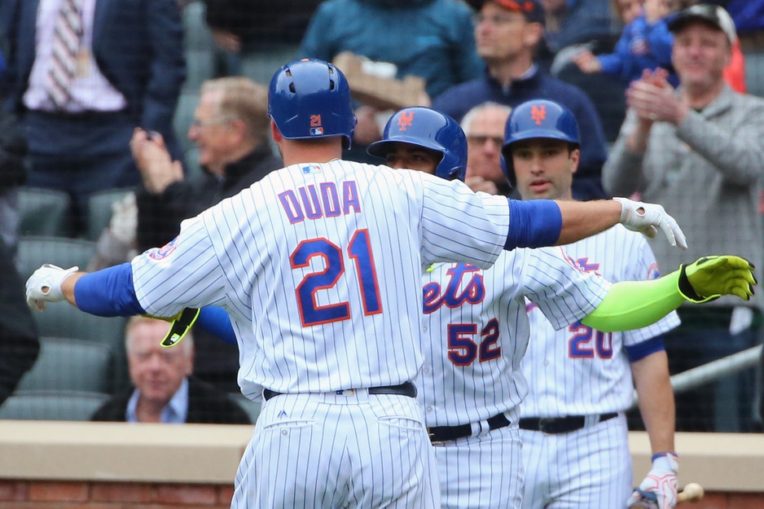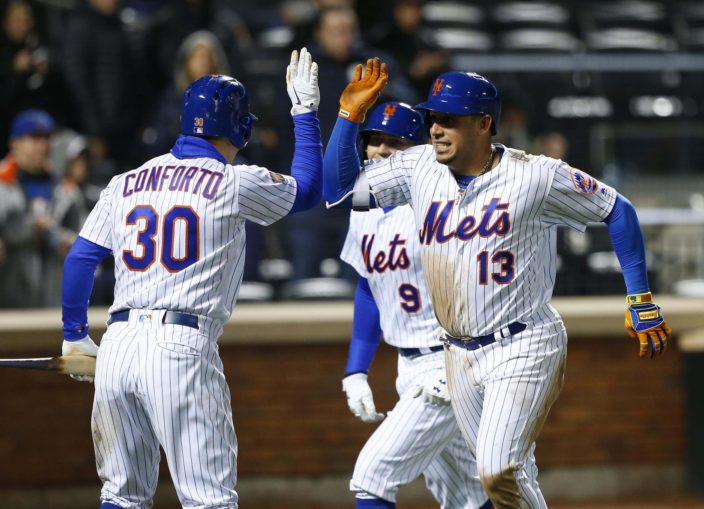
An MMO Fan Shot by Kevin Deutsch
It was the bottom of the ninth when I walked into Keenan’s on Broadway in the Bronx, took a seat at the bar, and, hoping to spur the Mets toward a rally, clutched the Mr. Met charm on my key ring.
The talisman had previously brought the Mets plenty of luck, like during their exhilarating run to the World Series in 2015. I’d squeezed it during every late-inning pitch–every nail biting at-bat–of that postseason.
The charm had come up short before, too, like during Game 7 of the 2006 National League Championship Series, its powers proving no match for Adam Wainwright’s season-ending curve ball.
Still, the unimpressive looking charm–a scuffed up, plastic, thumb-sized version of Mr. Met–had a record well above .500 in games for which I’d summoned its mysterious forces. I was convinced it gave the team an edge no rally cap, or in the Mets’ case, parakeet, could provide.
As I settled into my seat at the bar that afternoon in 2017, squeezing the miniaturized Mr. Met, I felt certain it would get the team’s slumping hitters going. Cespedes. Duda. Reyes. All they needed was a little luck to awaken their dormant bats.
I needed a little luck in my own life, too.
My second nonfiction book, “Pill City,” had come under attack in the press and on social media, the subject of allegations of fabulism. The book was a true story, with many names and details changed to protect the people I’d written about. In the press’ eyes, such changes constituted fabrication. Several reporters worked to discredit my work, but my journalism was solid, my publisher stood by me, and no retractions or corrections were issued as a result of the controversy.
Still, my reputation had been tarnished as a result of the scrutiny and, like the Mets, I needed a turnaround.
I felt my key chain talisman might be the key to unlocking the team’s fortune–and, just maybe. my own. In writing, as in baseball, no superstition is too outlandish to ignore.
That afternoon, though, a win wasn’t in the cards: the opposing team’s closer set our last three hitters down in order. Afterwords, my plastic Mr. Met seemed to stare back at me, his cartoonish eyes saying: “There’s only so much I can do.”
A man seated two chairs down from me at the bar saw me communing with the inanimate object, and suggested I’d be better off transferring my allegiance to the Yankees.
“Root for the Mets and you’ll always be disappointed,” he said. “You’ll never see a Yankee fan talking to his keychain.”
I told the man he was undoubtedly right. It turned out he was a Mets fan, too, and we traded stories about our team for the next hour or so, sipping Budweisers as consolation for the baseball-inflicted pain we’d endured.

Over the next few weeks I watched more games at Keenan’s, and the man and I struck up a friendship. Now in his late 50s, Juan had lived his entire life in the Bronx – a Mets fan in Yankee country – and seemed glad to have found a Bronxite as devoted to the Mets as he was. His suggestion that I defect to the Yankees had been a test, he later told me; a way to gauge my level of commitment to the Amazins.
Later, with the Mets in the midst of a rare winning streak, he asked how I’d procured my Mr. Met charm –and how I first became aware of its powers. A skeptic of the charm when we first met, Juan had since come around to thinking the object was at least partially responsible for our team’s solid play following the All-Star break.
I explained that I’d found the charm a block from Lou Gehrig’s old home on Delafield Avenue, dropped there, perhaps, by one of the baseball fans who make the pilgrimage there to pay respects to the Iron Horse. I would later write about these baseball pilgrims in a piece for the Riverdale Press.
I slid the charm onto my keychain that day, and the following season found myself absentmindedly clutching it during Mets games. It was a nervous habit, but it seemed to have an effect. I felt better when squeezing the charm, and the Mets seemed to play better, too.
“Whatever works,” Juan said.”Maybe it can help with your writing.”
A retired construction company manager, Juan had been encouraging me to keep writing journalism and books in spite of the scrutiny my work was facing. He said he’d once had a bad fall while on a job site in Brooklyn and spent several weeks in the hospital. Doctors weren’t sure he’d ever return to work, but he did so in a matter of months.
“I wouldn’t give up, no matter what anybody told me,” he said. “That’s the key to everything–you can’t quit.”
The same thing held true for the Mets, he explained. As bad as we’d played before the All-Star break, the second half offered the possibility of redemption. And if it took a ratty-looking keychain charm to make redemption seem just a little more likely, then why not keep believing?
“You always gotta believe,” Juan said, echoing Tug McGraw’s eternal optimism.
Last July, Juan was visiting his son in Gwinnett County, Georgia, when he suffered a massive heart attack and, thanks in part to the fact that that same son was an ex-paramedic, survived. Mets games weren’t the same without Juan, but I knew he was catching highlights on his iPhone whenever the doctors allowed. To help hasten his recovery, I mailed him my Mr. Met charm. Amazingly, it seemed to help: the doctors said his tests evidenced a surprisingly quick recovery. They released him well in advance of their initial estimate.
But his luck couldn’t hold out forever.
Earlier this week, Juan died of heart failure in his native Puerto Rico, surrounded by family and friends. His heart had finally given out, but his Mets fandom had endured: a cousin of his, also a baseball junkie, had whispered him the score updates to Mets games during the final week of his life. His cousin admitted to me he had occasionally told him the Mets were ahead when they weren’t, resulting in a fictional six game-winning streak that lifted Juan’s spirits more than any treatment he’d received.
The Mets, of course, are enduring a historically bad run this June—one that Juan, blessedly, knew nothing about. As far as he knew, the team had chosen the final week of his life to go on a torrid run featuring numerous clutch homers—mammoth shots his cousin had conjured out of thin air—and superb pitching.
Before he died, Juan asked that the Mr. Met keychain be placed in a box with other pieces of baseball memorabilia his family would eventually bury with him, including a handful of infield dirt he’d procured in the moments after the final out of the ‘86 World Series.
I miss Juan, and want more than anything to honor him this season. In August, I intend—along with his Mets-loving cousin—to spread some of Juan’s ashes across the outfield at Citi Field. It won’t be an easy feat to pull off. But I know Juan will be watching over us with the Mr. Met keychain at his side, imploring us to believe.
Here’s hoping it can still bring a little luck.
* * * * * * * *
Kevin Deutsch is a third-generation Mets fan and author of two books, “Pill City” and “The Triangle.” He has worked on staff for the Daily News, Newsday, The Miami Herald, and other newspapers. Contact him on Twitter @pillcitybook.
Have something you want to say about the Mets? Send your article to [email protected] or use this Contact Form. Or ask us about becoming a regular contributor.














